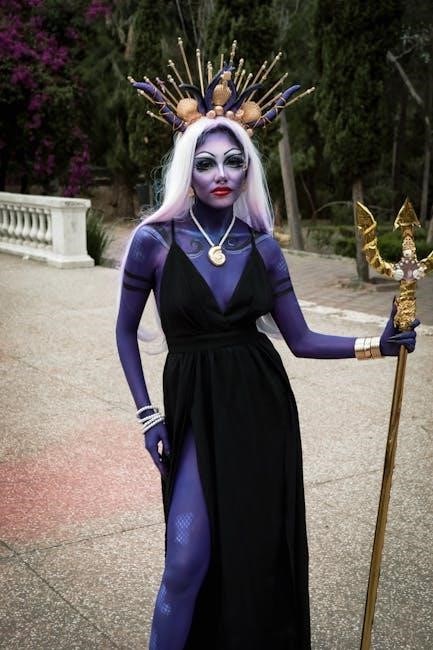The Broadway play John Proctor Is the Villain reimagines the classic character from Arthur Miller’s The Crucible, exploring themes of morality, feminism, and societal judgment through a modern lens․
Overview of John Proctor and the New Perspective
The Broadway play John Proctor Is the Villain offers a fresh, provocative reinterpretation of John Proctor, traditionally viewed as the moral hero of Arthur Miller’s The Crucible․ This new perspective flips the script, presenting Proctor as a flawed, even villainous figure, whose actions are reexamined through a modern lens․ The play explores themes of power dynamics, accountability, and the complexities of human morality․ By shifting the narrative, it challenges audiences to question their assumptions about Proctor’s character and the broader societal issues he represents․ This bold reimagining invites viewers to consider the intersections of guilt, redemption, and justice in a contemporary context․

The Original Play: “The Crucible”
Arthur Miller’s The Crucible portrays John Proctor as a morally complex figure, grappling with adultery and redemption amid the Salem witch trials, highlighting themes of hysteria and justice․
Context and John Proctor’s Role
Set during the Salem witch trials, Arthur Miller’s The Crucible presents John Proctor as a flawed yet deeply human figure; As a farmer and community member, Proctor’s moral integrity is tested by his affair with Abigail Williams, which undermines his reputation and fuels the trials’ hysteria․ His refusal to confess to false accusations highlights his struggle for justice and personal redemption․ Proctor’s role as a tragic hero emerges through his internal conflict, as he grapples with guilt, betrayal, and the consequences of his actions․ His story serves as a critique of societal fear, corruption, and the dangers of unchecked power, making him a central figure in exploring the play’s themes․
John Proctor’s Moral Journey
John Proctor’s moral journey in The Crucible is a profound exploration of guilt, redemption, and integrity․ Initially, his affair with Abigail Williams reveals his moral failings, casting a shadow over his character․ However, as the witch trials escalate, Proctor’s commitment to truth and justice becomes evident․ He risks his life to expose the hysteria, refusing to falsely confess to witchcraft, even when faced with certain death․ This transformation underscores his growth from a flawed individual to a symbol of moral courage․ His ultimate sacrifice highlights the enduring power of personal integrity in the face of overwhelming oppression, making his journey a central theme of the play․
The Flaws of John Proctor
John Proctor’s flaws are central to his character, making him a deeply human and relatable figure․ His most significant flaw is his adultery with Abigail Williams, which not only damages his marriage but also fuels the accusations against him․ Additionally, Proctor’s pride and initial reluctance to confront the court demonstrate his moral shortcomings․ His failure to immediately expose Abigail’s deceit reflects a lack of courage and foresight, ultimately contributing to the tragic outcome․ These flaws, however, also highlight his capacity for growth and redemption, as he eventually confronts his mistakes and stands up for justice, even in the face of death․

The Broadway Play: “John Proctor Is the Villain”

The Broadway play, directed by Danya Taymor and written by Kimberly Belflower, reimagines John Proctor as a villain, exploring #MeToo themes through a high school lens․
Background and Premise
The Broadway play John Proctor Is the Villain reimagines the iconic character from Arthur Miller’s The Crucible in a modern context․ Set in a high school classroom in rural Georgia, the story is inspired by a student’s provocative question about John Proctor’s morality; This inquiry sparks a journey of self-discovery and empowerment among the teenage girls, who grapple with themes of guilt, power, and justice․ The play explores how Proctor’s flawed character can be seen through a contemporary lens, challenging traditional perceptions of heroism and villainy․ By blending historical drama with a coming-of-age narrative, the play offers a fresh perspective on Miller’s classic tale․
Themes: #MeToo and Feminism
The play John Proctor Is the Villain delves into the themes of the #MeToo movement and feminism by reimagining the dynamics of power and consent․ It shifts the narrative from Proctor’s perspective to that of the women, particularly Abigail Williams, exploring her motivations and the societal constraints that shaped her actions․ The story highlights how women’s voices were historically silenced and how their agency was stripped away․ By focusing on the teenage girls’ interpretations of Proctor’s character, the play connects past and present, drawing parallels between the Salem witch trials and modern discussions of sexual misconduct and gender equality․ This reinterpretation challenges the traditional portrayal of Proctor as a tragic hero, instead presenting him as a flawed figure whose actions have lasting consequences․ Through this lens, the play sparks conversations about accountability and the complexity of human behavior․
Reimagining Proctor’s Character
The play John Proctor Is the Villain radically reinterprets Proctor’s character, shifting his role from a sympathetic hero to a flawed antagonist․ By focusing on his adultery and lack of accountability, the narrative emphasizes his moral failings․ The story explores how Proctor’s actions, particularly his relationship with Abigail, contributed to the chaos of the witch trials․ This reinterpretation challenges Miller’s original portrayal, offering a fresh perspective that aligns with contemporary critiques of power dynamics and gender roles․ The play’s approach invites audiences to question their assumptions about Proctor, presenting him as a complex figure with both admirable and villainous traits․ This bold reimagining sparks dialogue about historical narratives and their modern relevance․
Playwright and Director
Playwright Kimberly Belflower and director Danya Taymor collaborate to bring a fresh perspective to John Proctor’s story, blending modern themes with historical drama in John Proctor Is the Villain․
Kimberly Belflower’s Vision
Playwright Kimberly Belflower’s vision for John Proctor Is the Villain centers on challenging traditional narratives by presenting John Proctor as a flawed, even villainous figure․ Drawing inspiration from contemporary movements like #MeToo, Belflower recontextualizes Proctor’s actions within a modern feminist framework․ Her script examines the complexities of power dynamics, guilt, and redemption, offering a bold reinterpretation of Arthur Miller’s classic character․ By flipping the perspective, Belflower invites audiences to question their assumptions about morality and justice, creating a thought-provoking dialogue between past and present․ This innovative approach has garnered significant attention, making her play a timely commentary on historical and current social issues․
Danya Taymor’s Direction
Danya Taymor’s direction of John Proctor Is the Villain masterfully brings Kimberly Belflower’s provocative script to life․ Taymor’s approach emphasizes the emotional intensity and moral ambiguity of the characters, particularly Proctor, through bold staging and nuanced performances․ Her use of minimalist sets and dynamic lighting creates a haunting atmosphere, underscoring the psychological tension of the story․ By focusing on the inner conflicts of the characters, Taymor highlights the play’s themes of guilt, power, and redemption․ Her collaborative style with the cast ensures a deeply human portrayal, drawing audiences into the complexities of Proctor’s character and the broader societal implications of his actions․

Reception and Impact
John Proctor Is the Villain has sparked intense debates, dividing audiences and critics with its bold reinterpretation of Miller’s classic․ Its cultural impact is undeniable, challenging traditional narratives and fostering conversations about power, morality, and societal judgment․
Critical Reviews
The play John Proctor Is the Villain has received mixed reviews, with critics praising its bold reinterpretation of Arthur Miller’s classic while others critique its controversial premise․ Some highlight its thought-provoking exploration of feminism and the #MeToo movement, calling it a necessary challenge to traditional narratives․ However, others argue that the play oversimplifies Proctor’s complexity, reducing him to a one-dimensional figure․ Despite the divide, the production is widely acknowledged for its timely themes and its ability to spark urgent conversations about power dynamics and moral accountability․ The play’s daring approach has solidified its place as a significant work in contemporary theater, even as debates over its execution continue․
Audience Response and Cultural Impact

Audience Response and Cultural Impact
John Proctor Is the Villain has sparked intense audience reactions, with some praising its bold narrative and others expressing discomfort with its unconventional portrayal of Proctor․ The play’s exploration of feminism and the #MeToo movement resonates deeply with younger audiences, particularly women, who see it as a powerful commentary on systemic injustice․ Theatergoers have noted its ability to provoke difficult conversations, making it a cultural touchstone․ The play’s impact extends beyond the stage, encouraging broader discussions about historical narratives and contemporary social issues․ Its success highlights a growing appetite for reinterpreted classics that challenge traditional perspectives, ensuring its influence will be felt for years to come․

John Proctor Is the Villain challenges perceptions of a classic character, offering a fresh, thought-provoking narrative that sparks dialogue on morality, power, and societal judgment․
Significance of the New Interpretation
The reinterpretation of John Proctor as a villain in the Broadway play John Proctor Is the Villain challenges traditional perceptions, offering a bold, contemporary lens to examine morality, power, and societal judgment․ By flipping the narrative, the play sparks crucial conversations about accountability, feminism, and the complexities of human nature․ This fresh perspective not only reimagines Proctor’s character but also invites audiences to reflect on how historical figures are perceived and judged․ The play’s relevance to modern movements like #MeToo underscores its significance, making it a timely and thought-provoking addition to the theatrical landscape․